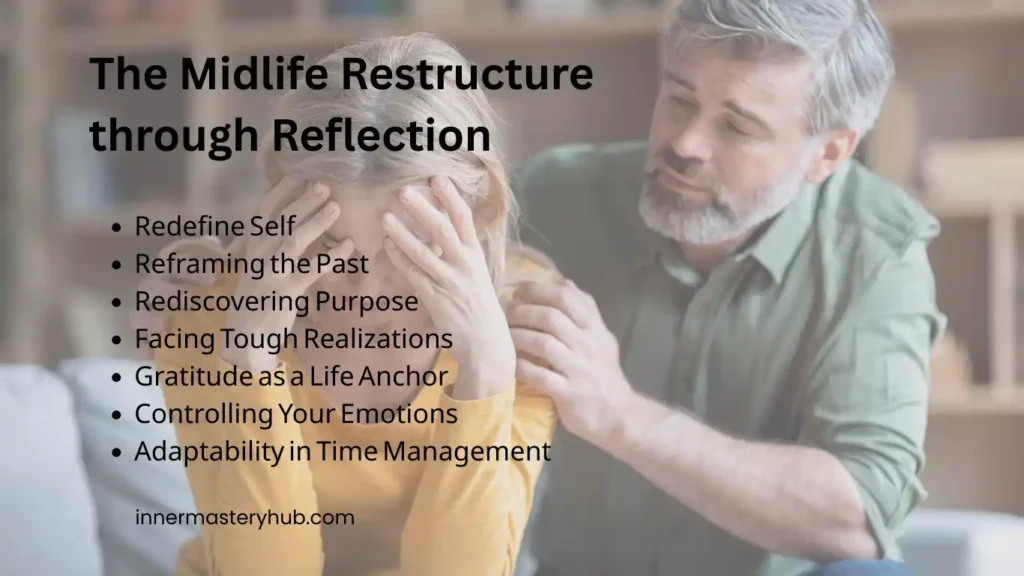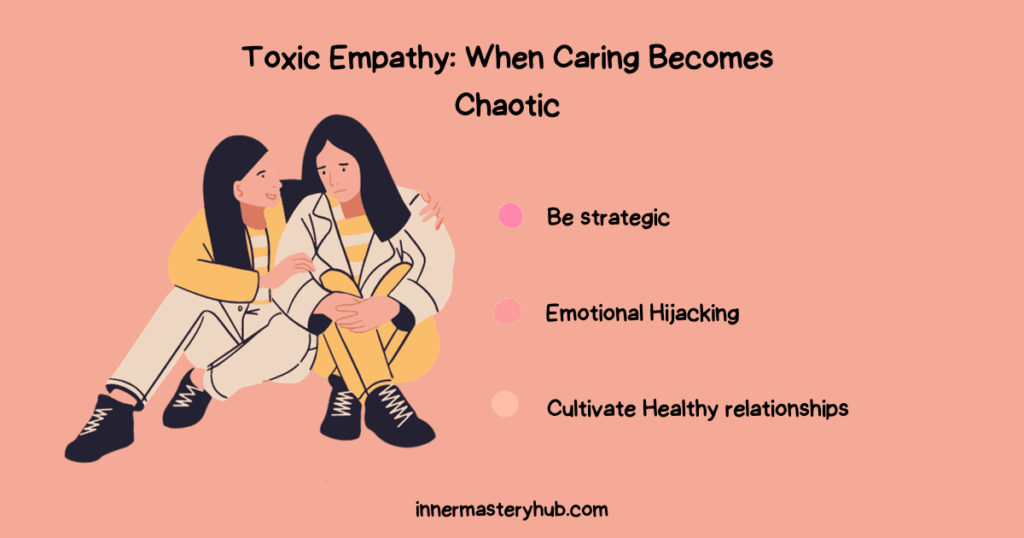Stop Listening to Negativity Before It Destroys Your

In a world filled with noise, it’s easy for negativity to shape how we think and feel. Stop listening to negativity inside and outside — the doubts in your mind and the discouraging voices around you. These thoughts drain your energy and block your growth. Learning to silence negativity isn’t about ignoring reality; it’s about protecting your peace and focusing on what truly matters.
When you stop listening to negativity inside and outside, you begin to hear your inner strength more clearly. This post will guide you to recognising, releasing, and rising above negativity so that you can live with confidence and calm.
How to stop listening to the negative voice in your head
Everybody has experienced when the doubtful voice seems to be speaking the loudest, clouding their judgment. The good news is that you don’t have to let your inner critic dictate your actions. Here’s how to put a stop to the bad talk by following this guide.
To start, awareness is crucial. Observe those times when the critical voice begins to speak. What sets it off? By recognising these triggers, you can better comprehend the patterns and get a jump start on stopping those negative thoughts.
Next, Stop Listening to Your Negative Inner Voice. Consider whether this concept is genuine or merely a perception. Our inner critic tends to exaggerate things a lot. You begin to weaken the hold these ideas have over you by challenging them.
Positive affirmations should replace negative ones. As corny as it sounds, you may overcome self-doubt by reminding yourself of your accomplishments and qualities. Build a mental library of encouraging statements to turn to when negativity starts to creep in.
Surround yourself with good energy. Seek positive effects by doing what you enjoy, hanging out with positive people, or absorbing motivational media. When you prioritise optimism, the negative voice finds it far more challenging to win.
And last, cultivate self-compassion. Acknowledge that self-doubt is a common emotion and that it’s acceptable. Be gentle to yourself as you would a friend going through a difficult period. Remember that you are a work in progress, and that’s okay.
How to Stop Listening To Your Ego
For millennia, philosophers and psychologists have explored the complex concept of the ego. Generally speaking, the ego is the mental region responsible for our feelings of self. The aspect of ourselves gives us the impression that we exist independently of other people and the environment.
Although the ego is sometimes associated with negativity, it is a vital component of our personalities. It supports our identity formation, enables us to make choices, and helps us establish objectives. On the other hand, an overly inflated ego might become problematic.
Aspects of the psyche that strive for approval, recognition, and self-preservation are frequently associated with the ego. It may appear as a defence mechanism that shapes attitudes and actions to uphold a specific identity or self-image. The ego is linked to fears, desires, and the drive to conform to others.
Here are some signs that your ego might be out of control:
- You are constantly seeking approval from others.
- You often compare yourself to others.
- You have a hard time accepting criticism.
- You are always trying to prove yourself.
- You have an inflated sense of self-importance.
Like tuning out a tireless critic, calming the ego may be transformational. The following steps will assist you in navigating the procedure:
Develop Awareness. First, focus on your thoughts and identify moments when your ego takes centre stage. Being conscious of it is the first step in removing its impact. When it interjects with conceited or critical ideas, pay attention.
Distinguish Yourself from Your Thoughts. Recognise that your thoughts do not define you. Identifying with these ideas frequently feeds the ego and gives one a false sense of importance. Try acknowledging your thoughts without becoming sucked into them by seeing them as fleeting clouds.
Examine Your Reasons for Acting
Consider your reasons before acting, whether you’re making a decision or responding to something. Is it motivated by ego, a need for approval or dominance, or is it in line with your true self and principles? You can gain a deeper understanding and focus your intentions by using this thoughtful method.
Seek Feedback. Promote candid criticism from mentors or close friends. Giving constructive criticism can help you identify areas where your ego may impede your ability to grow personally or professionally.
What is your inner voice?
Our minds constantly generate ideas and commentary, which we refer to as our inner voice, internal monologue, or self-talk. It’s the voice that describes our experiences, assesses our choices, and offers advice for the future. The inner voice can be constructive in certain circumstances, but it can also be a wellspring of negativity and self-doubt.
Here are some real-life examples of how the inner voice can manifest:
- Presenting: You may hear your inner voice telling you, “You’re going to mess up,” or “Everyone will think you’re stupid,” before a presentation. Anxiety and problems with performance can result from this negative self-talk.
- Deciding on a job offer: Your inner voice may tell you that you’re not qualified for the position or that you can’t manage the workload. These uncertainties may keep you from seizing an excellent chance.
- Faced with a social situation, your inner voice may tell you, “Everyone will judge you,” or “You’re not interesting enough to talk to,” during a social event. Connecting with people and feeling at ease in social situations might be hindered by this negative self-talk.
How to Stop Listening to Your Negative Inner Voice
- Although it is challenging to silence the inner voice, there are techniques you can use to mitigate its adverse impact and cultivate a more encouraging and upbeat internal dialogue. The following advice is provided:
- Recognise your inner voice. Recognising the existence of your inner critic is the first step towards taming it. Keep an eye on your thoughts during the day and take note of any instances in which your inner critic or discouragement begins to speak.
- Face your negative thoughts. Disprove the truth of your negative thoughts inside and outside whenever you notice yourself doing it. Ask yourself if any evidence supports your unfavourable preconceptions.
Stop listening to other people’s opinions.
We are susceptible to the powerful effect of other people’s opinions. They can influence our decisions, how we perceive ourselves, and even our overall happiness. But we must never forget that other people’s opinions are just that—opinions. It is improper to give them more weight than their merit warrants, as they don’t always accurately reflect reality.
We may be curious about other people’s opinions for various reasons. Maybe we fear rejection or condemnation, or we seek approval from others. We should, for whatever reason, stop listening to what other people think and start following our gut.
Here are some tips on how to stop listening to what other people are saying:
1. Keep in mind that their viewpoints are only that—opinions. They do not define you, nor are they facts.
2. Consider why it matters to you what they think. Are you looking for approval? Does rejection terrify you? You can begin to address your motives once you have a clear understanding of them.
3. Give your own principles and convictions priority. What matters most to you? What values do you uphold? You are less susceptible to the ideas of others when you are firmly rooted in your principles.
4. Make self-compassion a habit. Treat yourself with kindness, particularly when you’re feeling low. Everyone has diverse viewpoints and is prone to making mistakes. Avoid criticising yourself.
Stop listening to respond.
However, in most cases, when we strive to stop listening to the negative voices both inside and outside ourselves, we also need to learn how to be sympathetic to others by lending them a shoulder and waiting for them to share their story.
This is where learning to listen to someone in need without reacting and practising empathy comes into play. People occasionally want to be heard and not receive unwanted counsel.
Listening is one of the most essential abilities that lets us comprehend and relate to others. However, we occasionally discover that we listen more to react than to understand honestly. This may result in misunderstandings, annoyance, and lost chances for a closer bond.
Here are some tips on how to stop listening to respond and start listening to understand:
1. When listening, focus on the other person and be in the present. Put your phone away, look directly into your eyes, and refrain from planning your next move.
2. Try paraphrasing what you’ve heard to make sure you’ve comprehended the other person accurately and aren’t misinterpreting them.
3. Try to listen without passing judgment, even if you disagree with what the other person is saying. This involves setting aside your emotions and ideas to make an effort to understand their perspective.
4. Seek clarification: Seek clarification if something is unclear to you. This will demonstrate to the other person your interest in their ideas and feelings.
5. Think about what you’ve heard: Once the other person has completed speaking, pause to consider what they have said. What do you believe their primary argument was? What do they think of the situation?
6. Carefully consider your response: After you have had a chance to think, give the other person a careful response. This entails considering their viewpoint and refraining from impulsive responses.
FAQs about “Stop Listening to Negativity inside and outside”
What does “stop listening to negativity inside and outside” mean?
It means noticing and choosing not to give weight to negative thoughts inside and outside or influences from others (outside). You still hear them, but you don’t let them control your feelings, decisions or identity.
Why is it important to stop listening to negativity inside and outside?
Constantly listening to your negative inner voice or to others can harm your mood, self-esteem and motivation. Letting go of that negativity helps you stay calmer, more focused, and able to pursue what matters, rather than being stuck in fear or doubt.
How do I recognise negativity inside and outside?
Inside: complaining or critical self-talk such as “I’m not good enough.” Outside: people who constantly criticise or put you down, or environments that drain you. Recognise both, then you can respond rather than react.
What practical steps help stop listening to negativity inside and outside?
• Pause and observe the thought or voice.
• Label it (“that’s a critical thought”).
• Set a boundary with external negativity (limit exposure).
• Choose a positive action instead.
Can mindfulness help stop listening to negativity inside and outside?
Yes. Mindfulness allows you to notice thoughts or external criticism without being influenced by them. For example, you observe the thought “I’m worthless” and see it’s just a thought—not an absolute truth.
How do I manage negative people or environments (outside negativity)?
Practice boundaries: limit time with draining people, steer conversations away from constant complaining, and make your own space for positive influences. Also, remember their negativity reflects their struggles, not your worth.
What about internal negativity—my self-critical voice?
You can distance yourself from that voice by treating it like you’re advising a friend (rather than believing it). Label the thought, ask “Is this helpful?” and then redirect to a more realistic viewpoint.
How long does it take to stop listening to negativity inside and outside?
There’s no fixed time; it depends on how often you practise noticing and redirecting both internal and external negativity. Over time, you build a stronger “filter”, so negativity has less impact.
Is it ever okay to ignore negativity completely?
Not always—sometimes negative feedback is valuable. The key is not to let it dominate you. Rather than entirely ignoring it, assess whether it’s helpful, then decide how to respond. If it’s purely destructive (inside or outside), you choose not to engage.
What benefits will I gain by stopping to negative thoughts inside and outside?
You’ll likely experience less stress, better self-confidence, more emotional freedom, improved focus and healthier relationships. Your inner world becomes less chaotic, and you’re less pulled by external drama or internal doubt.






